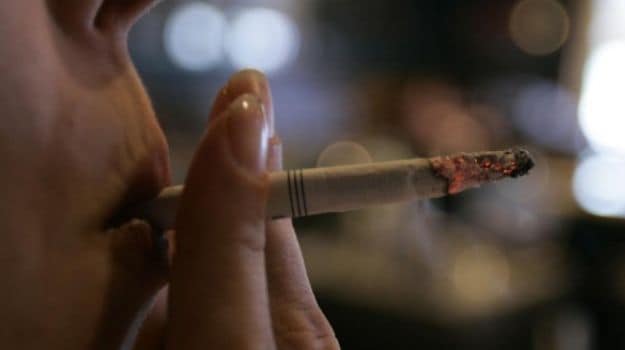More people signed up to program that offered $800 cash than one that threatened them with losing a $150 deposit – but fewer gave upPeople are more likely to quite smoking if they are threatened with a penalty, a new study has found.
Research published on Thursday in the New England Journal of Medicine offered a large group of CVS employees the choice of joining two different programs to encourage them to quite smoking.
Many more people signed up to a program that offered them an $800 reward than one that threatened them with losing a $150 deposit and only offered a $650 reward.
But only a small proportion of those in the $800 reward program actually quit.
Those in the penalty program were twice as likely to quit.
The study signed more than 2,500 people up to two programs designed using decades of research in behavior, economics and health to help them quit smoking.
In the penalty program, participants had to give a deposit of $150. If they abstained from smoking for six months they got their deposit back, plus a reward of $650.
In the reward program, the smokers were given $800 if they abstained from smoking for six months. There was no deposit.
“People are going to be much more loth to lose $150 than they would be ecstatic to gain $150,” said Dr Scott Halpern, an associate professor of medicine at the University of Pennsylvania and an author of the study.
“I think the most important implication here is that a dollar is not a dollar. How you deliver those dollars is of fundamental importance when we seek to combat a whole range of behaviors.”
More than half of those who gave the $150 deposit had quit smoking by the end of six months, while only 17% of those who took part in the $800 reward program had quit smoking by the end of the trial.
The researchers assigned participants either into the penalty program or the reward program. But only 13.7% of those who were signed up for the penalty program accepted it, while 90% of the other group accepted the rewards program.
The large difference in participation rates meant that the rewards program was a greater success with regard to the number of people quit smoking.
Halpern and his colleagues also found that offering incentives, with or without risk, proved far more effective than therapy or weaning substitutes for nicotine such as gum or patches. People who took part in the penalty program were five times as likely to quit as those who used counseling or nicotine replacements.
The goal, Halpern said, is now to refine the deposit programs so that they will be more attractive without losing their effectiveness.
“There are a lot of different tweaks that are conceivable,” he said, “like reducing the deposits, increasing the rewards, changing the timing of the distributions of the rewards, for example making them more frequent or more front-loaded or even more back-loaded.”
The research could help develop programs not just for smokers but other destructive behaviors, such as addictions to alcohol and other drugs, overeating and underexercising. The study was also motivated by an interest in developing better health programs for large employers, and was run with assistance from CVS, which stopped selling tobacco products in 2014 and is rolling out a program that requires employees who smoke to make a deposit of $50.
Halpern emphasized the high healthcare costs caused by smoking: “Because these costs for smokers are largely subsidized through higher premiums for non-smokers, both employers and employees have reason to want to see this change.”
The Centers for Disease Control and Prevention (CDC) estimates that 443,000 people die in the United States every year due to smoking or secondhand smoke, and that more than 8.5 million more suffer serious illnesses caused by smoking. The agency also tallies up the economic toll, estimating a nearly $200bn total in medical costs and lost productivity caused by tobacco use.
Companies spend between $800-900 per employee per year on these healthcare costs, Halpern said, adding that the researchers thought the money is often spent in ways that “reflect suboptimal understanding of human psychology”. He noted how many employees don’t feel the consequences of rewards or penalties because the manipulations on their paychecks happen automatically and behind the scenes.
Cass Sunstein, director of the program on behavioral economics and public policy at Harvard Law School, compared the penalty program to taxes in an editorial for the New England Journal.
“A 5¢ tax on the use of a grocery bag is likely to have a much greater effect than a 5¢ bonus for bringing one’s own bag,” he wrote, while adding that reward programs play into people’s preconceptions: “most people tend to be unrealistically optimistic, at least about their own prospects.”People are going to be much more loathelothsmo to lose $150 than they would be ecstatic to gain $150, the study’s lead author, Scott Halpern, said. Photograph: Carolyn Kaster/AP









